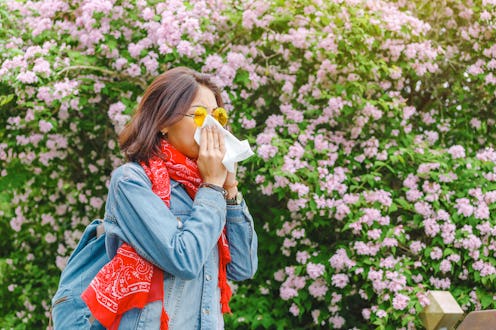Health
What To Know About Taking More Than 1 Piriteze Per Day
Hayfever season is horrible, but experts want you to be careful about how you combat symptoms.

Hayfever season is the worst, with many of us staying in just to avoid itchy eyes, a runny nose, sneezing, coughing. Tree pollen is rife in May and June, while grass pollen takes hold in June and July, and weed pollen runs right through to September. While there are many tips and techniques to reduce symptoms, antihistamines such as Piriteze are recommended by the NHS and other health experts. But can you take more than one Piriteze a day?
While popping more than one antihistamine when things get bad seems tempting, Piriteze tablets are active for 24 hours a day, meaning there is really no need for more than one in a day. In short, with most antihistamines, it’s best to take just one per day. “One should always stick to the manufacturers’ recommendation,” Dr. Adrian Morris of the Allergy Testing Clinic says. “Piriteze dose is one per day.”
Piriteze contains the antihistamine cetirizine, which targets everything from watery eyes to sniffly noses caused by allergies. It is a well known non-drowsy antihistamine, and is therefore a good choice for daytime use.
The NHS advises a daily dose of 10mg a day of cetirizine, whether it's for hayfever season or to target a specific allergy when you experience symptoms. As Piriteze tablets come in 10mg doses, it is therefore only recommended to take a single tablet a day, rather than anything more. The dose may even be slightly less depending on your age (children will probably need to take less) and if you suffer from things like kidney problems, you will also have to alter your dosage (it's best to ask your doctor in this case), the NHS says.
The NHS also explains that, if you miss a dose, you should not make up for it by taking a double dose. Instead, just take one and carry on as normal. They do note that taking more than the recommended dose is unlikely to hurt you, but you may experience side effects.
The most common (one in 100 people) side effects of taking cetirizine are the following:
- feeling sleepy and tired
- headaches
- dry mouth
- feeling sick (nausea)
- feeling dizzy
- stomach pain
- diarrhoea
- sore throat
- cold-like symptoms of the nose
- itching or a rash
- tingling in your hands and feet
- feeling agitated
Although it's not recommended to take more than one oral antihistamine a day, the NHS does explain you can use the tablets alongside other hayfever treatments, such as steroid nasal sprays (Beconase, Rhinacort Aqua, and Flixonase Nasules are named) or eye drops.
When asked about combining remedies, Associate Clinical Director at Bupa Health Clinics Elizabeth Rogers says, “Different medical remedies for hay fever can help you to manage different hayfever symptoms. For example, antihistamines are best for watery eyes and sneezing, whereas nasal sprays can be more effective for a blocked or runny nose.”
However, she stresses that you should always check with your doctor before mixing medicines, and always make sure you’re following medical advice.
Alternatively, if you suffer from terrible hayfever (I feel you), it's worth stopping by your doctor's office this season, as they can prescribe stronger antihistamines that can be potentially more effective than over-the-counter options. As Director of Science, Health & Wellness at Holland & Barrett Dr Subashini M says, “If you are struggling to manage your symptoms and your quality of life is being impacted or if you experience side effects to the medications you have tried, do see your GP for further advice as there are some stronger medications that are available on prescription.”
Subashini M adds that if you have “severe and persistent hayfever”, you can ask your GP about immunotherapy as an option. As she explains, “immunotherapy involves being exposed to small amounts of pollen over time, to increase resistance to its allergic effects.”
It’s also worth noting that there are some non-medical remedies that can help. For one, increased face mask usage has led to reduction of allergic rhinitis (nose irritation caused by allergies) during the pandemic, according to a study published in The Journal of Allergy and Clinical Immunology: In Practice.
Speaking about other options Rogers says, “Wearing wraparound sunglasses or a mask can be effective in preventing pollen from coming into contact with your eyes and nose,” adding that applying barrier balms like Vaseline around the nostrils also help to prevent pollen from entering your nose. Subashini M recommends tying your hair back when you’re outside and changing your clothes when you come inside can help reduce your exposure to pollen. She says monitoring the pollen count is also useful, which you can do via the Met Office, so you can “avoid peak hay fever trigger times”.
Adopting these solutions, alongside your Piriteze, can help you ensure you have a pollen-free rest of summer.
Contributions by Rebecca Fearn, Kay Leong, and Sophie McEvoy.
This article was originally published on